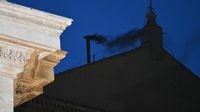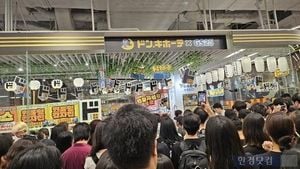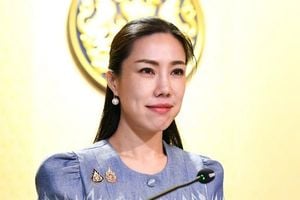VATICAN CITY — On Wednesday, May 7, 2025, Catholic cardinals from around the globe gathered in the Vatican for the commencement of a conclave to elect a new pope, following the death of Pope Francis on April 21. This conclave is marked by its unprecedented geographical diversity, featuring 133 cardinals from over 70 countries, making it one of the most inclusive gatherings in the Church's 2,000-year history.
As the cardinals entered the Sistine Chapel, they surrendered their cellphones and took an oath of secrecy, a tradition aimed at ensuring the confidentiality of the voting process. The chapel was meticulously checked for any listening devices, underscoring the ancient and secretive nature of this ritual.
The day began with a solemn Mass at St. Peter’s Basilica, where Cardinal Giovanni Battista Re, the 91-year-old dean of the College of Cardinals, addressed his fellow “princes of the church.” He emphasized the need for a new pope who could navigate the complexities of contemporary global challenges. “The next pope must be someone up to the challenge of confronting global uncertainty and this difficult and complex turning point in history,” he stated, urging the cardinals to prioritize the good of the Church and humanity above personal considerations.
Later in the day, the cardinals processed to the Pauline Chapel for prayer and reflection, seeking divine guidance as they prepared to cast their votes. The first round of voting commenced around 5:45 PM local time, but the atmosphere was charged with anticipation as onlookers awaited the telltale smoke signal from the chimney of the Sistine Chapel.
After a lengthy wait, black smoke emerged at approximately 9:05 PM, indicating that no candidate had received the necessary two-thirds majority of votes to become the next pope. This outcome was not entirely unexpected; historically, it is rare for a pope to be elected on the first day of a conclave, with only one instance of such an event occurring over 500 years ago.
Thousands of faithful, tourists, and curious onlookers gathered in St. Peter’s Square, their eyes fixed on the chimney as black smoke billowed above. The scene was one of mixed emotions, as the crowd applauded the announcement of the inconclusive vote. The conclave is set to continue with up to four rounds of voting scheduled for the following day, with two votes in the morning and two in the afternoon.
Interestingly, the delay in the appearance of the smoke spurred speculation among observers. Some suggested that a lengthy meditation delivered by Cardinal Raniero Cantalamessa, who addressed the cardinals after the doors of the chapel were closed, may have contributed to the wait. However, the true reason may remain a mystery, as the cardinals are bound by their oath of secrecy.
As the conclave progresses, the cardinals will need to navigate a complex web of alliances and preferences to reach a consensus on their next leader. A candidate must secure 89 votes to be elected, and the current configuration of the College of Cardinals adds layers of intrigue to the process. Of the eligible cardinals, 135 are under the age of 80, though two were unable to attend due to health issues.
While the conclave unfolds, a group of activists from the Women’s Ordination Conference made headlines by releasing pink smoke in a demonstration for gender equality within the Church. Their message was clear: “We are saying to the cardinals, you cannot keep ignoring 50% of the Catholic population.” They called for the next pope to address the issue of women’s inclusion, a topic that has gained traction in recent years but remains contentious.
The conclave is not only a pivotal moment for the Catholic Church but also a reflection of the changing dynamics within global Christianity. The diversity of the cardinals, with significant representation from Italy, the United States, Brazil, Spain, and France, underscores the Church's global nature.
As the world watches closely, the next few days will be critical in determining the future direction of the Catholic Church. The smoke signals from the Sistine Chapel will continue to draw crowds, with each plume offering a glimpse into the decision-making process that will shape the Church for years to come.
In the coming days, the cardinals will reconvene, and the voting will resume. If no pope is elected by the third day, the voting will pause for a day of prayer, a tradition that underscores the spiritual significance of this moment. The conclave will conclude only when a successor to Pope Francis is found, and the world awaits the announcement of a new leader with bated breath.
As the faithful gather and the cardinals deliberate, the future of the Church hangs in the balance, with the hope that the next pope will guide the 1.4 billion-member Church through the challenges and uncertainties that lie ahead.




